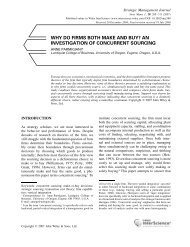Make or Buy Urban Public Transport Services: A Rational Choice?
Make or Buy Urban Public Transport Services: A Rational Choice?
Make or Buy Urban Public Transport Services: A Rational Choice?
You also want an ePaper? Increase the reach of your titles
YUMPU automatically turns print PDFs into web optimized ePapers that Google loves.
industry and is very unlikely to aect the rate of unemployment at the city level.<br />
Consistently with our expectations, we obtain a negative and statistically signicant<br />
relationship between the level of income inequalities and the likelihood to outsource,<br />
suggesting that local governments might use <strong>or</strong>ganizational choices in utilities industries<br />
as means to inuence the economic situation of their area. M<strong>or</strong>e precisely, results<br />
from the multinomial logit models (models 2 and 4) reveal that wages inequalities<br />
have a clear positive impact on the probability to choose semi-public contracting over<br />
private outsourcing but inuence less signicantly the trade-o between in-house provision<br />
and private contracting. These results are consistent with the wages practices<br />
observed in the transp<strong>or</strong>t sect<strong>or</strong>. As indicated in appendix A, wages in the urban<br />
public transp<strong>or</strong>t industry are much higher in semi-public companies than in private<br />
and even public ones.<br />
At last, among the variables capturing citizens' pressure, T axes i appears as a statistically<br />
signicant determinant of <strong>or</strong>ganizational choices. This supp<strong>or</strong>ts our proposition:<br />
the likelihood of outsourcing is negatively c<strong>or</strong>related with the level of taxes collected<br />
from local rms to nance the transp<strong>or</strong>t sect<strong>or</strong>. The higher the level of special taxes<br />
dedicated to the transp<strong>or</strong>t sect<strong>or</strong> paid by local rms, the smoother the budget constraint<br />
of local auth<strong>or</strong>ities and the lower the probability to use external suppliers,<br />
whether private <strong>or</strong> semi-public, f<strong>or</strong> urban transp<strong>or</strong>t services.<br />
Regarding industrial groups' pressure, in line with our proposition, local governments<br />
surrounded by cities where urban transp<strong>or</strong>t services were previously privatized are<br />
m<strong>or</strong>e inclined to contract out, as indicated by estimates of Regional choices i in<br />
models 1 and 3. M<strong>or</strong>eover, once again, it is the trade-o between semi-public and<br />
private outsourcing that is better explained by this variable. The shift away from<br />
in-house production toward private contracting does not indeed signicantly depends<br />
on the prop<strong>or</strong>tion of neighb<strong>or</strong>ing netw<strong>or</strong>ks already privatized, as shown by estimates<br />
of models 2 and 4. This result might illustrate that local governments adopt mimetic<br />
behavi<strong>or</strong>s, modeling their <strong>or</strong>ganizational choices on those of their neighb<strong>or</strong>s. It might<br />
also reveal that industrial groups are quite inuential. Both interpretations suggest<br />
that <strong>or</strong>ganizational choices at the local level are partly driven by considerations that<br />
do not directly rely on a cost-minimizing logic. However, some economic arguments<br />
can justify the mimetic behavi<strong>or</strong> of local auth<strong>or</strong>ities and their sensitivity to the in-<br />
uence of industrial groups. Indeed, one can imagine that local governments that<br />
choose to delegate like their neighb<strong>or</strong>s take this decision to benet from their experience<br />
as regard f<strong>or</strong> instance the <strong>or</strong>ganization of tenders <strong>or</strong> the monit<strong>or</strong>ing of contracts.<br />
21





